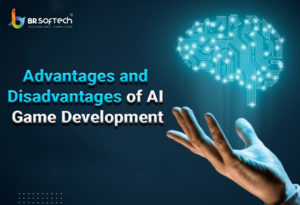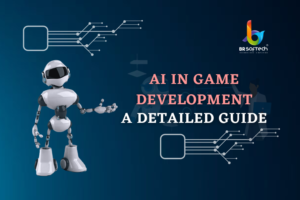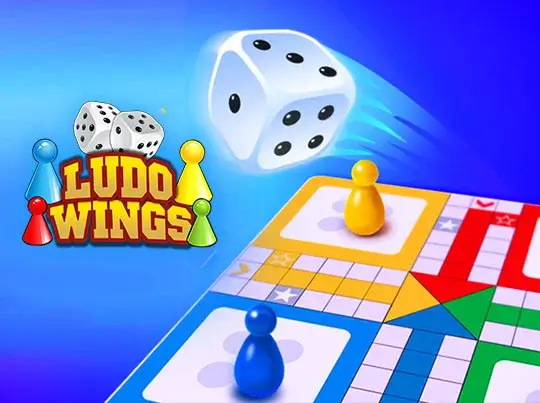Artificial Intelligence has been one of the most useful technologies when it comes to the development of games especially in niches like shooting, racing, strategy, and cards. BR Softech is a prominent company that has mastered the art of leveraging AI in the development of bots and NPCs in the development of video games.
AI Game Development Services
We provide a number of AI game development services. Let’s take a brief look at them.
Video Game Development Using AI
Our major expertise and maximum project deliverance come from AI video game development services. Our services have helped bring a change to the world of video games, where players enjoy a fresh experience while interacting with NPCs. The advanced AI algorithms we use help in organizing an intuitive progressive-level generation that looks non-repetitive.
AI-Powered NPCs
We also help integrate non-playing characters into your already existing video games. Our team of excellent developers creates NPCs that resemble real-life characters and exhibit human behaviors. We feed in algorithms that help NPCs make complex decisions, and they adjust their difficulty level according to the player’s skill.
AI Designing
Another one of our services in AI development includes providing customized services in AI designing. We help in designing a plethora of elements involved in gaming, be it intelligent NPCs, immersive gameplay mechanics, or PLG algorithms. The custom AI design curated by our agency delivers an unmatched experience to the users.
Get a Quote
Features of AI Game Development
If you develop your game with the help of AI technology and leverage it by clubbing it into your game, the results can be exceptional. We will list down some of the features of AI game development that help you understand the potential of AI in the development of games.
-
Intelligent NPCs
The bots in the MMORPGs and mission games contribute a lot in giving good or bad experiences to a player. If the bots have a generic behavior then it becomes predictable and users easily understand whether they are in a fight with a real player or an NPC. However, bots designed using AI behave according to their rival and adjust their skill level that match their opponents to give an immersive experience.
-
Adaptive Storylines
AI-powered storylines change according to the user’s in-game decisions. This helps in providing a curated experience to different players playing the same experience. We can give credit to AI for this feature in games.
-
Player Behaviour Analysis
AI is also used to analyze player behavior. This feature of AI in game development is a leap, as the game’s difficulty does not run on a linear path. As opposed to that, the game’s mechanics constantly change and evolve matching the expertise of the player.
-
Anti-Cheat Solutions
AI helps eliminate chances of cheating and ensures fair play. The anti-cheating mechanisms run by Artificial Intelligence do not allow any kind of cheating eventually providing a safe space for players across different ecosystems.
Benefits of AI Game Development
Developing a game through AI has a lot of benefits. Players can feel the difference between a generic Non-playing character and an NPC developed through Artificial Intelligence. Let’s learn about the different benefits players can enjoy while playing a game developed through AI.
Enhanced Player Engagement
AI-powered features like anti-cheat solutions, immersive PLG algorithms, and behavior analysis by AI help in player engagement. More and more players engage in the game and spend more time on screen due to these AI features.
Dynamic Gameplay Experience
One of the many benefits of AI game development is that it curates dynamic gameplay experience for players. The AI technology adapts and changes according to user behavior and provides a constantly changing game environment.
Realistic Game Characters
The elements of the game that interact with users, be it NPC or other characters, are made realistic with the help of AI. These elements display behaviors that are life-like. These complexities in elements add depth to the storyline of the game providing more substance to the plot.
Adaptive Difficulty Levels
AI algorithms help in curating difficulty levels according to the player. Hence, you don’t need to design different difficulty levels and let the users decide what they want to play. Instead, the user can start playing the game and the adaptive power of AI will change the difficulty level of the game accordingly.
Deployment
This is the final stage in augmented reality app development. The process of deployment will be carried forward depending on the choice of augmented reality mobile app development.
Application Maintenance & Support
After deployment, the real testing of your application begins when end users install your application on their device. The demand of end-users keeps changing, hence the application will require constant updates. The top augmented reality app development company, will offer you a post-application maintenance & support system,
AI Game Development Process
Our AI game development process spans out in six stages, from conceptualization to post-launch assistance. We have a refined development process that ensures a perfect outcome of your game idea.
-
Conceptualization
We hear your idea in the first phase and conceptualize the game mechanics accordingly. We also help you understand the market trends and how they can amalgamate with your idea of the game.
-
Research and Blueprint
Post the conceptualization, we research and make a blueprint of the way the development process will map out. This step includes the display of the prototype of the game and the game mechanics among others. We also let you know the duration required to finish the game.
-
Game Art Design
Once the blueprint is approved, our 3D design artists work on the characters and curate the theme of the game. Our designers pay attention to detail in every element and character of the game. We dominantly use Maya to design 3D characters of the game.
-
AI Integration
Our skilled AI engineers test the game and integrate AI in different parts of the game. From generating levels/missions to adjusting the behavior of NPC through AI, the AI integration step includes all that.
-
Game Testing
We have a top-notch QA and testing team. The team makes sure the game is bug-free, and the AI integration is working seamlessly. They test the game’s mechanics and suggest any required changes. This phase gives the green light to the development process and the game moves to the final phase: Deployment.
-
Deployment
The deployment of the game takes place on mobile phones and PCs. If you choose a cross-platform gaming option, we also develop it to be compatible with all platforms. Moreover, our services extend beyond deployment and we give assistance in post-launch activities.
Our Technology Stack for AI Game Development Solutions
Why Choose BR Softech for AI Game Development
BR Softech is a well-known game development company in the AI game development landscape. The company stands out due to its exceptional features mentioned below.
Exceptional AI Developers
BR Softech boasts a league of AI developers well-versed in their art.
Seamless Communication
We never leave our client’s side, and be there for them 24x7.
Budget-Friendly
We offer competitive prices while providing state-of-the-art services.
End-to-end Assistance
We provide full-cycle AI game development services. Our services include custom solutions that satisfy our client’s requirements.
Frequently Asked Questions
Ans. AI plays an important role in game development. The technology helps in generating procedural levels in recurring games. Moreover, it also helps add life-like NPCs in video games.
Ans. AI in game development can help make the storyline more immersive because of its feature of adapting and changing the plot according to the user behavior.
Ans. Simple card and board games developed with the use of AI having minimum use like anti-cheat mechanisms can start at 20,000 dollars to 50,000 dollars depending upon the AI-integration. However, AAA games with heavy AI use in NPCs and dynamic environments can cost beyond 500,000 dollars.
Latest Blog
Intensify your knowledge to navigate your digital transformation with us.

10 Best Freemium AI Games to Play in 2025
With time as technology evolved, these games started shifting toward a new change which not…
Read More...
Advantages and Disadvantages of AI Game Development
What are the advantages and disadvantages of Artificial Intelligence? Does the technology facilitate game development…
Read More...
AI in Game Development: A Detailed Guide
Artificial Intelligence is everywhere and it is impossible to impact its effect on various sectors.…
Read More...Our Location
USA Office
21 Overlook Ridge Terrace
#523 Revere, Boston,
MA 02151 USA
Singapore Office
3 Shenton Wy,
#24-05 Shenton House,
Post box 068805
Singapore
Australia Office
199 Princes Drive,
Morwell, Vic-3840
Australia
LEGAL DISCLAIMER
BRSOFTECH private limited (BRSOFTECH) doesn't promote or support any non-authorized gaming or gambling in India or outside India. Read More
FRAUD WARNING DISCLAIMER
Some individuals or business claiming falsely themselves as BRSOFTECH representatives to cheat or gain some benefits. Read More







